Care and Cleaning
Bathroom tub and sink – Use of any abrasive cleanser (e.g. Comet®) or abrasive pad/sponge will permanently damage the finish and render them impossible to clean thereafter. Damage of this nature is your responsibility. Use NON-ABRASIVE CLEANERS ONLY such as Scrubbing Bubbles®.
Kitchen sink – DO NOT USE STEEL WOOL PADS OR HARSH SCOURING POWDERS SUCH AS COMET OR BON-AMI. These will scratch the stainless steel surface. It is best to use a soft rag using soap and water or specially formulated stainless steel cleaners found at many hardware and appliance stores.
Cabinets and Drawers – Water and wood do not coexist very well. Do not place wet or moist items in drawers or cabinets.
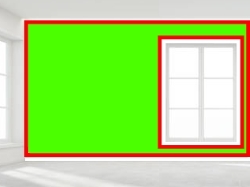
Walls – DO NOT use adhesive tape, sticky hangers, molly bolts, contact paper, anchors (particularly self-drilling) or any other type of material or device which will damage the walls. Small nails and picture hangers (less than 1/8 inch in diameter) in reasonable quantities (less than 18 small holes per room) are acceptable as long as they are NOT within two inches of the ceiling, molding or baseboard. An example is shown to the right — the red area represents the two inch no-hole zone; the green area shows where small holes are permitted.
Ceilings – Holes and attachments of any kind (tape, hangers, anchors, etc) are strictly prohibited. Repairs almost always require repainting the entire ceiling, an expensive proposition.
Carpets – should be professionally cleaned as needed to maintain proper appearance and condition. For everyone's convenience, a professional carpet cleaner is scheduled at the end of each lease period to clean the carpets at a reduced group rate.
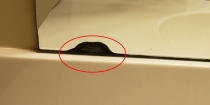
Bathroom Mirror – Spray the cleaner directly onto a cloth, never the mirror surface. Avoid cleaners with a heavy ammonia base, this damages the backing and mirror edges. A cleaning solution (and moisture in general) that penetrates the back of the glass destroys the silver coating resulting in non-reflecting black spots.
Trash
All trash should be placed in a plastic garbage bag. Do not leave trash of any kind on your front or back porch/deck or in any of the common areas. Please dispose of trash in the dumpster located in front of the 600 building. Do not leave items on the ground next to the dumpster or toss trash from behind or the side of a dumpster.
Ceiling Fans
Ceiling fans are a great way to keep cool in the summer and warm in the winter. There are three ceiling fans — one in each bedroom and one in the living area. During the summer the fan should blow air straight down, so your ceiling fan needs to run in a counter clockwise direction as you look up at it. The warmer it is, the higher the speed should be. During the winter, your fan should run at a low speed in a clockwise direction.
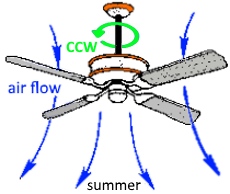
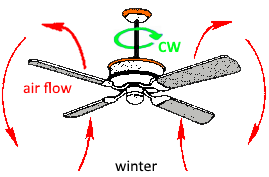
The ceiling fan makes you feel cooler in the summer by creating an artificial breeze that evaporates moisture from your skin. This allows you to set your thermostat higher, saving money on air conditioning bills. When the fan rotates counterclockwise (while looking up at it), the slant of the blades pushes air down, causing a noticeable breeze. The faster the fan spins, the cooler you feel.
The opposite effect can be achieved in the winter by gently circulating hot air trapped near the ceiling. Since heat rises, the temperature near the ceiling is greater than at floor level. The fan is set to rotate clockwise on low to keep from creating a strong draft, which would cool you down just like it does in summer. Instead, the air near the ceiling is pushed up and outward, causing it to circulate down near the perimeter of the room. With the air at floor level being warmer, the thermostat can be set lower, saving money and helping the environment at the same time. Heat generated by the fan’s motor is a bonus in the winter, so you can keep it running whether you are present in the room or not.
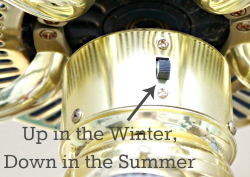
A two position sliding switch is located on the body of the fan motor. Slide the switch up (towards the ceiling) for clockwise rotation (winter mode which moves air towards the ceiling). Slide the switch down (towards the floor) for counter clockwise rotation (summer mode which moves air towards the floor).
Separate wall switches control power to the ceiling fan light (switch furthest from the fan) and the ceiling fan motor (switch closest to the fan). Two pull chains located on the fan control the light (chain through the center post without a handle should be left in the on position) and the fan motor speed (chain off-center through the glass dome with a wooden handle). The fan has three running motor speeds with the fastest speed selected first. Successive pulls of the chain select medium, low, and off.
Appliances
A number of appliances are provided for your convenience. We ask that you familiarize yourself with their proper operation. We encourage you to “read the manual” recognizing that this is not a popular activity. Improper use of an appliance may require an expensive service call for which you are responsible.
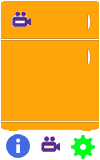

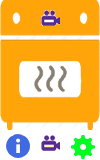
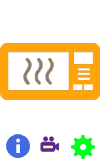
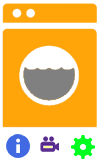
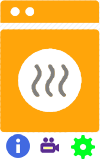

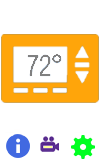
Cooking Safety

More than 100 million cooktops and ranges are being used in the U.S., most without incident. Cooking, when done properly, is a safe activity. However, unattended cooking remains the leading cause of household fires in the U.S. and Canada.
With a few simple steps, you can greatly reduce the risk of cooking fires. Whether stirring up a quick dinner or creating a masterpiece four-course meal, here is a Recipe for Safer Cooking that you need to use daily.
Follow these steps to prevent cooking fires:
- Keep an eye on your cooking and stay in the kitchen. Unattended cooking is the #1 cause of cooking fires.
- Wear short or close-fitting sleeves. Loose clothing can catch fire.
- Watch children closely in the kitchen. Teach children to cook safely when they’re old enough.
- Clean cooking surfaces regularly to prevent food and grease build-up.
- Keep curtains, towels and pot holders away from hot surfaces. Store solvents and flammable cleaners away from heat sources. Never keep gasoline in the house.
- Turn pan handles inward to prevent food spills and put them out of reach of children.
If a cooking fire breaks out, take these steps:
- Call the fire department immediately. Call directly if possible. In many cases, 911 calls go to general emergency services.
- Slide a pan over the flames to smother a grease or oil fire, then turn off the heat and leave the lid in place until the pan cools. Never carry the pan outside.
- Extinguish other fires with baking soda. Never use water or flour on cooking fires.
- Keep the oven door shut and turn off the heat to smother an oven or broiler fire.
- Keep a fire extinguisher in the kitchen. Make sure you have the right type and training.
- Keep a working smoke detector in your home and test it monthly.
These safety tips are supported by AHAM, UL, the National Association of State Fire Marshals and the National Safety Council.
99 Wyatt Avenue Homeowners Association - Summary of Rules and Regulations
To create the most desirable residential atmosphere possible, the Board of Directors of 99 Wyatt Avenue Homeowners Association (HOA) is providing this summary of the Rules and Regulations found in the Bylaws and Master Deed. Owners should complete the back, make a copy for yourself, and return this to Foothills Property Management. Residents will be asked to acknowledge that they have received a copy of these rules. Please note that violators will be fined for infractions as indicated below.
- Occupancy: The City of Clemson has set the maximum occupancy for each Unit to three (3) unrelated occupants (family members are considered one occupant). Violating maximum occupancy laws will result in a $500 fine in addition to any penalty assessed by the City.
- Parking: See separate parking regulations. All residents must register their vehicles at 4towing.net to obtain a parking decal from Valley Services, Inc (VSI). No parking or driving in landscaped or grassy areas. Fine: $100 plus the cost of any property damages.
- Motorized Bikes: Mopeds may only be parked at one of the bike racks or in front of your car in one of your assigned spaces. They must be registered at 4towing.net and are subject to towing as outlined in the parking regulations. Do not drive on walkways. Fuel container storage is prohibited. Fine: $50
- Non-Motorized Bicycles: Bicycles may be stored at a bike rack or on your deck or patio as long as they do not block passages or walkways. Bikes may not be attached or chained to any railing or building structure. Fine: $50
- Pet Policy: The HOA does not prohibit domestic pets providing that they are not a nuisance to other residents. Tenants may be subject to a lease with a pet policy specific to a Unit. [Note that the rental agreement for your unit states that “Pets are not allowed. This includes any visiting pets. Violators will be fined $100 per day and subject to eviction.”] Pets must be on a leash at all times when they are outside and pet owners must clean up their pets’ waste. Pet owners may not breed animals or put up fences, runs or exterior crates/cages. Fine: $100
- Trash: Dispose all trash in one of the two, centrally-located dumpsters. Do not litter or leave trash, bottles, cans, etc. outside your door, on patios or decks, in the parking lot, on the ground next to the dumpsters, or toss trash over the fence surrounding the dumpster.
Fine: $100 - Decks and Patios: Only outdoor furniture is permitted on decks and patios. Do not cover decks with carpeting or attach anything to the wood. Do not leave patio umbrellas up when not in use as they may blow over and cause damage. No more than ten people on a deck. Fuel container storage is prohibited. Fine: $50 plus any damages
- Kegs are not permitted on decks or patios. Fine: $200
- Grills may not be used within ten feet of any structure, on decks or under a wooden deck. If grills are not moved away from buildings before use they will be prohibited. Fine: $100 plus any damages
- Satellite Dishes: Satellite dishes are not to be attached to any part of a building or roof. Satellites may only be on a tripod on your deck. Do not put holes in the deck. Satellites are not allowed on the grounds of the property ANYWHERE. Fine: $200 plus cost of removal
- Roof: Being on the roof is strictly prohibited. Fine: $100 plus damages
- Noise: No one shall make any noise that will disturb or annoy the occupants of any other Unit including any amplified sound outdoors, or emanating from any Unit or vehicle. Between the hours of 10:30 pm and 7:00 am, any unreasonably loud, disturbing or unnecessary noise is prohibited by the City of Clemson Code of Ordinances (Section 13-10). Report violators to the Clemson Police Department by calling 864-624-2000.
Fine: $100 - Tailgating: Is not permitted. Fine: $100
- Speed: The speed limit is 15 mph for the safety of all. Please obey the stop sign at the entrance to the community and follow one-way directional arrows.
- Although the Board shall have no obligation to take action, it may levy fines of up to $100 for the following prohibited activities:
- Any activity which emits foul or obnoxious odors, disturbs the peace or threatens the safety of occupants of other Units.
- Any activity which violates governmental laws or regulations.
- Any activity that cause an unclean, unhealthy or untidy condition outside the Unit.
- Any activity that cause embarrassment, discomfort, annoyance or nuisance to persons using the Common Elements or occupants of other Units.
- Use and discharge of firearms, firecrackers, or fireworks.
- Activities which collect, disturb or destroy vegetation or wildlife.
- Construction or placement of anything on the exterior of a Unit – including signs, bicycles, sports equipment, clotheslines, plant material, animal pens or fences.
- Working on or washing vehicles.
- Having fire pits, bonfires, outdoor fireplaces or burning leaves or garbage.
- Obstruction of walkways, driveways, and parking areas.
- Installing window air conditioning units.
- Riding motor bikes on walkways.
- Altering the Common Elements, exterior building walls or interior boundary walls without approval.
- Causing sound or light pollution.
- No article shall be hung or shaken from doors, windows or decks or placed upon the window sills or railings of the decks. Fine: $100
- Only two inch white wood or white veneer window blinds may be installed in any Unit.
- Owners who lease their units are responsible for their tenants and must observe all local and state laws/regulations regarding occupancy, smoke detector compliance, etc.
- Complaints must be made in writing to the Board of Directors.
99 Wyatt Parking Regulations
Vehicles can only park in designated spaces (Numbered or Visitor) if they display one of three permits (Resident Decal, Owner Hangtag, Visitor Hangtag). Permits are available through online registration beginning in August and are valid through August 31 of the following year.
| Resident Decal | Owner Hangtag | Visitor Hangtag | |
|---|---|---|---|
| Numbered Space | Only in a space assigned to the resident, owner, or their guest | ||
| Visitor Space | NO PARKING |
4 hour maximum; 24 hour waiting period Resident must be present with their visitor No commuters Moving a vehicle does not reset time |
|
| permit conditions | maximum of three residents per unit | one per non-resident owner | one per unit |
| associated with a specific vehicle and tag number | associated with a unit | ||
| no identifying information | unit number on hangtag | ||
Each Numbered space is assigned to a specific unit.
A Resident Decal must be attached in the lower corner (driver’s side) of the rear window.
A Hangtag must be attached to the rear view mirror and clearly visible from both the front and rear windows of the vehicle. A lost Visitor Hangtag can be replaced for a $25 fee and will be identified as a replacement. The previously issued hangtag is invalid and use of it is subject to a $250 fine and a towed vehicle.
More than one vehicle can be parked in a space with a red line at the back as long as no part of the rear vehicle extends beyond the red line.
Motorized Bikes may only be parked in front of your vehicle in a Numbered space. They must display a Resident Decal.
Vehicles parked in areas not designated above are subject to towing.
An owner or resident may request a vehicle parked in their assigned Numbered space to be towed.
No parking or driving in landscaped areas. Violators are fined $100 plus the cost of any damages.
Each unit is assigned two Numbered spaces. Additional Numbered Parking Spaces will be leased to residents for a fee subject to the following conditions:
- Lease term is from August 1 through July 31 of the following year
- Only one leased space per unit
- Leased spaces will be offered initially to residents of the 100 through 500 buildings as long as a double parking space is available to residents of the 600 and 700 buildings
- If more requests than leased spaces are received, a lottery will determine the recipients
- If less requests are received, they will be offered to the remaining residents
Revised: August 1, 2017
Neighborhood Information
Wikipedia: Clemson, South Carolina
